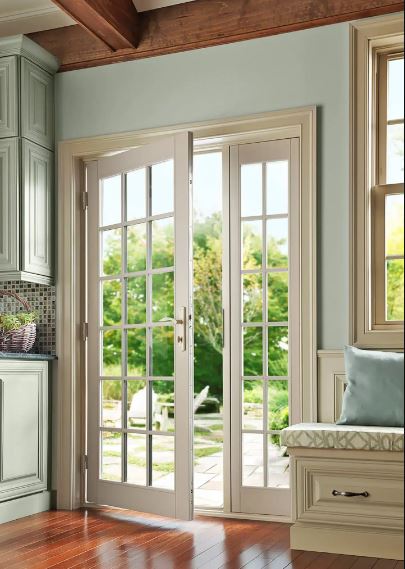Your home's doors play a vital role in aesthetics, security, and energy efficiency. But have you ever wondered, "What materials are your doors made from?" This guide delves into the world of door materials, exploring their characteristics, pros, and cons, helping you make informed decisions for your home.
Understanding Door Materials
Doors come in various materials, each offering unique features and benefits. Let's explore some common options:
Wood: A Classic Choice
Wood has been a traditional material for doors, valued for its timeless appeal and versatility. From elegant oak to rustic pine, wood doors offer warmth, durability, and customizable designs.
Wooden doors add charm and character to any home. They can be stained or painted to match your interior décor, making them a popular choice for both traditional and contemporary settings.
Steel: Strength and Security
Steel doors are renowned for their durability and security features. Made from galvanized steel, these doors offer unparalleled strength, making them resistant to forced entry and harsh weather conditions.
In addition to security, steel doors provide excellent insulation, helping to reduce energy costs and maintain indoor comfort. Their low maintenance requirements make them a practical choice for busy homeowners.
Fiberglass: Durability with Style
Fiberglass doors combine the strength of steel with the aesthetic appeal of wood. These doors are engineered to withstand extreme weather conditions, including heat, cold, and humidity, without warping, cracking, or rotting.
One of the key advantages of fiberglass doors is their low maintenance nature. They resist dents, scratches, and fading, retaining their beauty for years with minimal upkeep. With a wide range of styles and finishes available, fiberglass doors offer versatility and curb appeal.
Aluminum: Sleek and Modern
Aluminum doors are prized for their sleek, modern appearance and lightweight construction. They are resistant to corrosion, making them ideal for coastal areas or humid climates where moisture can be a concern.
While aluminum doors may not offer the same level of insulation as other materials, they are highly customizable and available in a variety of colors and finishes. Their slim profiles and expansive glass panels make them perfect for contemporary architectural designs.
Choosing the Right Material for Your Doors
Selecting the appropriate material for your doors depends on several factors, including your budget, aesthetic preferences, and functional requirements. Here are some considerations to keep in mind:
Budgetary Constraints
Wood doors tend to be more expensive than steel or fiberglass alternatives. While they offer unmatched beauty and craftsmanship, they may not be feasible for budget-conscious homeowners.
Climate Considerations
In regions with extreme weather conditions, such as hurricanes or heavy snowfall, steel or fiberglass doors are preferable due to their durability and resistance to moisture and temperature fluctuations.
Maintenance Requirements
If you prefer low-maintenance options, fiberglass or steel doors are the way to go. They require minimal upkeep and are less susceptible to damage from wear and tear.
Aesthetic Appeal
Consider the architectural style of your home and choose a door material that complements its design aesthetic. Whether you prefer the rustic charm of wood or the sleek modernity of aluminum, there's a material to suit every taste.
Visit Website: https://whiteeagle-windowsanddoors.co.uk/doors/
FAQs (Frequently Asked Questions)
- Are wooden doors prone to warping?
- Wooden doors can warp over time, especially if exposed to moisture or extreme temperature fluctuations. Proper sealing and maintenance can help prevent warping.
- Do steel doors rust easily?
- High-quality steel doors are treated with rust-resistant coatings to prevent corrosion. Regular maintenance, such as painting or applying protective sealants, can further extend their lifespan.
- Can fiberglass doors be painted?
- Yes, fiberglass doors can be painted to match your desired color scheme. However, it's essential to use high-quality exterior-grade paint and follow proper preparation and application techniques for best results.
- Are aluminum doors energy-efficient?
- Aluminum doors are not as energy-efficient as other materials, as they conduct heat and cold more readily. However, they can be equipped with thermal breaks and insulated glass to improve their energy performance.
- Do wooden doors offer good insulation?
- Wood is a natural insulator, providing excellent thermal efficiency. However, the quality of insulation may vary depending on the door's construction and thickness.
- Are steel doors loud when closing?
- Steel doors may produce more noise when closing compared to other materials. However, installing weather-stripping and proper hardware can help reduce noise levels.
Conclusion:
The materials used in your doors can significantly impact their performance, longevity, and aesthetic appeal. Whether you prioritize security, energy efficiency, or design versatility, there's a door material to meet your needs. By understanding the characteristics and benefits of each option, you can make informed decisions and enhance your home's comfort and style.





Comments